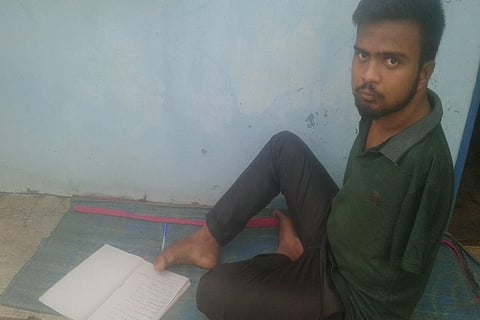

When Zakeer Pasha sought to apply for a Telangana state government scholarship through the ePass portal, he was asked his fingerprint biometric to process the application through aadhaar authentication. The only problem was that Zakeer did not have hands; and the ePass authentication of the application did not accept iris-based authentication due to a Government Order (GO).
A 2013 Government Order, which introduced aadhaar verification using biometrics for online authentication, did not take into consideration persons with disabilities, for whom fingerprint authentication is not possible. The GO applies to both Telangana and Andhra Pradesh’s ePass system and still stands.
The ePass or electronic payment and application system for scholarships, as the name suggests, is an application and payment receiving platform for those availing government scholarships.
Zakeer has an Aadhaar number, but the ePass system accepts only fingerprints for authentication. “Iris recognition system was used to register my Aadhaar,” says Zaheer, who writes and types on a keyboard using his feet.
The youth secured 58% in his high school board exam and 70% in his intermediate board exams. He then pursued a Bachelor of Commerce (Computers) at Kakathiya University and graduated in 2017.
“In 2015-16, I learnt that I was eligible for government scholarship. I immediately applied but did the officials did not process my application as fingerprint authentication was not possible,” added Zaheer.
The 22-year-old was born with underdeveloped hands but has learnt to write and type using his feet. He hails from Kaghaznagar Komaram Bheem district in Telangana and is presently pursuing his post graduation in Acharya Nagarjuna University through distance education.
“I am eligible for post graduation scholarship as well, but again, the fingerprint authentication poses a problem. I had approached the ePass office in Hyderabad but the officials said they are helpless due to the GO,” he recalls.
For Aadhaar authentication for persons with disability, the UIDAI has made authentication possible either through a fingerprint scan or retinal scan. However, the GO does not take iris-based authentication into account.
Zabi B, a senior assistant officer from with the Telangana State Minorities Finance Corporation Limited, Komaram Bheem district, where Zakeer’s application was to be processed, spoke to TNM.
“We will foot the bill for his undergraduate education on humanitarian grounds. The bills have been submitted and approved, the money will be credited to his account on Monday. This is the first time we have received such a case,” he added.
According to Nipun Malhotra, founder Nipman Foundation and advisor to NITI Aayog, “There is a lack of representation of stakeholders while framing government policies.”
As per Census 2011 in India, about 2.68 crore out of 121 crore people is termed disabled, albeit Nipun argues that the figures are much higher. “The census says that about 2.21% of India’s population is disabled, but independent surveys peg the figure at 7-8%, which is about 70-80 million people,” he added.
However, policy framing for the disabled is done by the Ministry of Social Justice and Empowerment and state-wise departments, in isolation and with no inter-departmental consultations.
The UIDAI had relaxed the norms for aadhaar registration for persons with no iris or fingerprints in 2013. A person without hands can provide his/her iris biometrics for registrations and the visually-impaired can provide fingerprints. “But there is also no awareness among district-level officials in states that biometrics are not necessary for the disabled. No one is aware of the exemptions,” Nipul added.
As for Zakeer, he is happy that the fee for his undergraduate course is being refunded. However, the uncertainty of a job lurks in the mind of this youth, whose six-member family is dependant on the Rs 1,500 that he receives monthly through the Aasra pensions.